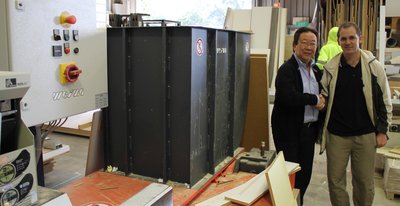Weima manages wood waste in workshop
Thursday, 15 August, 2013
St Mary’s Joinery was established in 1975 and works mainly on commercial building projects to produce quality custom-made joinery for various fit-outs such as offices, hospitals and schools. Located in the Sydney suburb of South Windsor, the business has a team of over 35 staff.
General Manager Matt White said the company was looking for a solution to manage wood waste in its busy workshop.
“We were at a stage where the workshop was like a snow storm!” he said. “It was a very dusty place to work and was becoming unmanageable, so we started to look into a Weima solution to manage the waste with a shredder and briquette machine.”
Both the Weima WL 4 Shredder and the C150 Briquetter were found to have impressive footprints, making them suitable for any busy, compact workshop where space comes at a premium.

“We saw the Weima demonstrated at AWISA [the Australian Woodworking Industry Suppliers Association exhibition] and liked the footprint of the machines,” said White. “We have a very compact workshop and really needed something that was small yet could do the job.
“We did find that some of the companies we approached for comparable estimates came across as ‘backyard operators’, which made me trust the Weima and DKSH solution even more.”
The Weima WL4 was commissioned in November 2012 along with a Weima C150 briquetting machine. White said it was “installed in about a day without any problems at all”.
The workshop’s waste extraction line feeds the shredded wood waste directly to the briquetter, which reduces the wood waste even more into a compressed briquette form. This reduces the amount of air and volume within the waste transport bins.
The shredder has a 600 x 1050 feeding hopper, which was suitable for the size of the offcuts that were left over as waste.
“Previously, we had a weekly average of 850 kilos of wood waste per bin. We have managed to get that up to around 1400 kilos since the Weima solution was installed. As a result, we have reduced our transport pick-ups from three to two bins per week,” explained White.
“Really, we’ve had no dramas with the Weima at all. It’s all been pretty hassle free.”
Turning high-emissions waste into fertiliser: study
Research from UNSW could transform waste products into fertiliser while cleaning up waterways and...
Project turns vineyard waste into reusable timber solution
A pilot project to reuse vineyard trellis posts has been launched in South Australia, marking a...
How Australia can increase its circularity rate
An expert said the solution could lie in developing onshore processing plants and creating...








